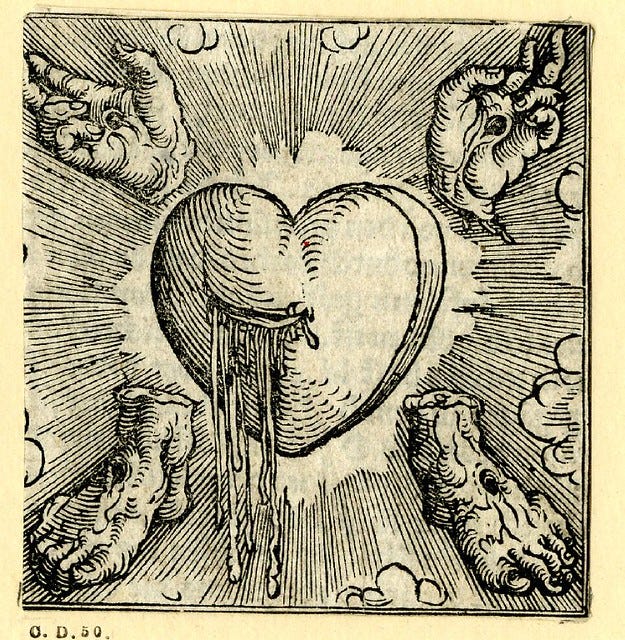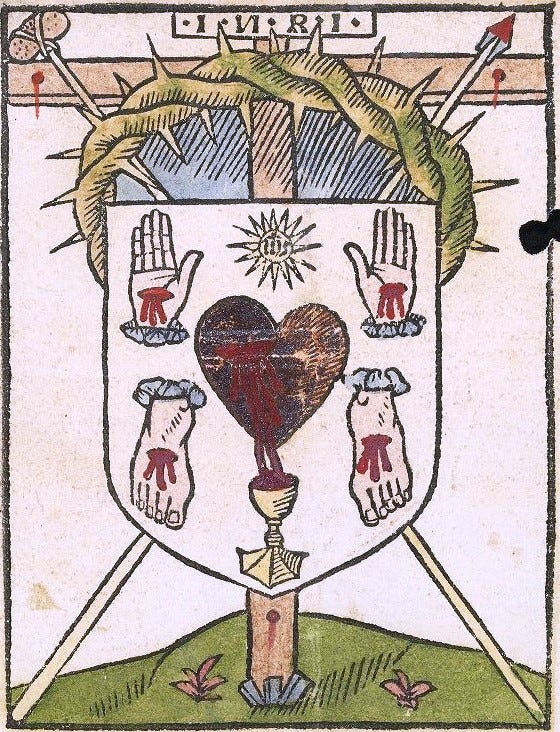Etching the word on your heart
A daily verse can guide your day and make God present in wonderful ways--with Additional Observations on reception history and art from the Five Wounds devotion
I had no art for this post, so in keeping with the season, I’m illustrating this with devotional art of the five wounds.
I don't have any deep thoughts for Holy Week as I get ready to log off and enter the mysteries of the suffering, death, and resurrection of our Lord. I've been in a lot of pain from my back, and I'm just praying I can get through the physical and emotional gauntlet of the next five days.
But I did want to consider something many of us do, and many others should. It's the idea of a daily verse: so simple it seems almost silly to write and publish about it. Then again, Brother Lawrence's The Practice of the Presence of God is almost absurdly simple, and yet remains a life-changing classic for those who absorb and follow its guidance.
We all have different prayer routines, as is right and proper. Mine is grounded in my Benedictine formation and clerical obligations: Lauds, Vespers, a day hour, Matins (Office of Readings), Compline (with my wife), the Angelus, lectio, a reading from The Rule, some spiritual reading. I started much smaller and struggled greatly to build the habit, but it was like any habits--you build and build. If all you have right now is an Our Father while you're rushing to begin your day, that's fine. Grace builds upon nature. As you cooperate the operations of grace will work on you.
We'll discuss building those habits another day, but for now I just want to talk about the idea of a Daily Verse. This is very simple and very popular, and if you haven't picked up the practice it's an easy one to start. Any number of devotionals, websites, or apps can you provide you with one, but I think it's better, if time allows, to find one in any morning routine which includes scriptures. Lacking any time or other resources, flip open a Bible and let your eye land where it does.

Today, one of the commentary quotes for the psalms leapt out at me and I wrote it down. I've come back to it several times already, and expect to recall it through the remainder of the day, which includes Holy Week rehearsal. The interesting thing about a regular habit of prayer that involves scripture is that it opens a line of communication for God to talk with you. After all, this is His Word. He speaks through it.
And nothing is random. A friend and I often marvel at how a particular line or prayer in the Daily Office goes right to the point of what's happening that day. It speaks directly to our condition, to our needs, and often to the news of the day.
These passages tend to leap off the page. They assert themselves. You find you can't leave them behind. As your eye moves to the next line it wanders back to absorb the previous verse more deeply. That's when you know you've found your verse for the day. You should jot it down, in a notebook, in an electronic file on your phone, or just on a random post-it note. Text it to your family. Post it on social media.
It becomes a lens through which you will see the events of the day. It will be the sound of the Spirit talking to you in moments small and large. And by the end of day, you'll almost certainly have committed it to memory and added it to the treasurehouse of God's word that you have with you always. You, then, become a volume of holy writ, carrying the scriptures with you, recorded on the pages of your mind, and etched in the very flesh of your heart.
My lens today is "We suffer all kinds of afflictions and yet are not overcome." (2 Cor 4:8) I prefer the longer quote in the ESV translation--"We are afflicted in every way, but not crushed; perplexed, but not driven to despair"--but the point is the same. Obviously, that is speaking directly to me in my personal physical pain, but there are also spiritual and emotional afflictions weighing upon myself and those around me. I expect to encounter more as the day goes on, and in that anamnesis God is present to me once again.
Notes for Holy Week
And so it begins: rehearsal tonight, then Holy Thursday, Good Friday, Vigil, and 7:30 and 9am masses on Easter. Has it been a good Lent for you? Mine was … fine. I mostly kept to discipline (no sugar, extra reading), but I could have done better. Twas ever thus.
The art this month is of the Five Wounds of Christ. You can pray the Chaplet of the Five Wounds here.
Reception History
The Wiley Blackwell Bible Commentary series is subtitled A Reception History Commentary. I have all 22 volumes of this on Verbum, and although I can’t vouch for every one of them, the editions I’ve used (Psalms, Luke, John) are thoroughly excellent. The commentary material is fairly general rather than deeply linguistic or theological, but its real contribution is the way it maps various attitudes, interpretations, and uses of the passages through history.
It’s good on the fathers (although the Ancient Christian Commentary on Sacred Scripture provides far more substantial patristic exegesis), but includes a variety of other interpretive trends. It also digs into where a passage is used in liturgy, literature, music, and art. As the author notes in the introductory volume for the Psalter: “our account begins where most commentaries end: the debates about the dates, authors and provenances of individual psalms are of minimal concern, because our emphasis is on the reception of individual psalms once the Psalter had become a recognized collection.”
Take Psalm 102, for example. After a good paragraph of general exegesis, author Susan Gillingham moves on to reception, from Talmud to modern times. Some samples:
Rashi, for example, notes that verse 14 (Eng. verse 13) refers to those in exile who have taken with them, as a memory of what they once had, the stones of Jerusalem. The imagery of a lonely bird (longing to return to a permanent home, as in verse 7) further suggests this context. Following the reference in verse 18 (‘let this be recorded for a generation to come’), the promise in verse 28 (‘The children of your servants shall live secure; their offspring shall be established in your presence’) is recited on Rosh HaShanah and at Yom Kippur, alongside the first verse of Psalm 103. … Psalm 102 is used frequently in the Christian liturgical year: it is often read on New Year’s Day, on Ash Wednesday, and after Lauds on Fridays during Lent, in part because of its theme of the brevity of human life and the dependence of all humanity upon God. It was marked out, at least as early as Augustine, as one of the seven penitential psalms of the church. Indeed, Augustine’s Confessions use verses from this psalm many times, the most frequent being verse 27: ‘But thou art the same, and thy years have no end’ which is cited at least nine times. .. Its use as a penitential psalm has resulted in many poetic paraphrases. One metrical version is by the nineteenth-century English poet John Clare (1793–1864): the third stanza below displays in rhythm and metaphor the sheer fragility of human life:
The wilderness’s pelican,
The desert’s lonely owl—
I am their like, a desert man
In ways as lone and foul.
As sparrows on the cottage top
I wait till I with fainting drop.
The penitential use of the psalm has also inspired a vast amount of music. Several composers have arranged all seven penitential psalms together: Orlando de Lassus composed seven motets as Psalmi Davidis Poenitentiales for Duke Albrecht V of Bavaria in 1563. His ‘Domine, exaudi orationem meam’ takes the eight traditional liturgical modes as his overarching idea. Henry Purcell’s ‘Hear my Prayer’ (c. 1680–82) was originally for the organ and a cappella choir, set mainly to the first verse of this psalm;
There’s much more, and the benefits of the approach should be obvious. It lays out the riches of tradition, tracking how people have responded to, interpreted, and used scripture. This is magnificent stuff.
That’s all for this week. May you all have a holy Triduum and a blessed Easter and Pascha.








